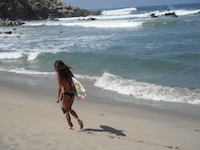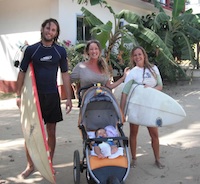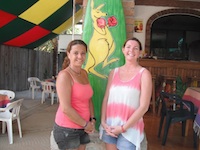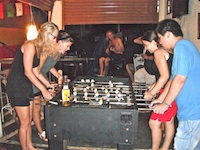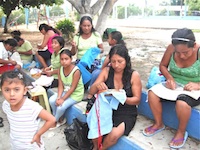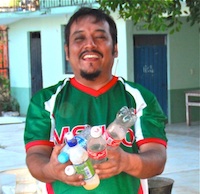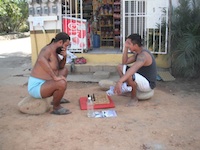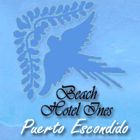The Punta: An Introduction
The Punta is probably Puerto’s fastest growing neighborhood and its most diverse. 30 years ago it was a forest of huizache trees and mesquite. Today it’s a lively community with a kindergarten, an elementary school, a middle school, and as of this year a high school. (The last two also serve children from neighboring communities.) There are luxury hotels and budget hostels; there’s even a sports bar. There is also a major building boom in private houses and vacation apartments.
Brisas de Zicatela includes both the south end of Zicatela beach and the hill above it known as la Cruz because of the enormous cross on the hilltop. There is a private, gated community called La Comunidad Ecológica which is the only place where the original forest has been preserved.
The Punta itself is one of Puerto’s best surfing beaches and the area has become a mecca for surfers and backpackers from all over the world. Australians make up the largest contingent at present, but you will also find travelers from Norway, Israel, Argentina and Brazil, as well as Mexicans from the capital and even an occasional American or Canadian. People stay here for a few days, weeks, months, even years drawn by the climate, the comradery and the low cost of living. The vibe is very like Ibiza in the hippie days of the 1960s, before it developed as a resort.
Echoing the international character of the area centered on Av. Alejandro Cárdenas and Heroes Oaxaqueños, the three biggest hostels are owned or run by Slovenians (Frutas y Verduras), an Italian (A La Casa) and Frenchmen (La Buena Onda). Two Australian women recently opened a restaurant called El Lugar, which may be the only place in Mexico specializing in Australian cuisine (think meat pies). The newest hostel, 8 Venado on Av. Justo Salvador, is owned by English-speaking anthropologists from Mexico City. And just for hanging out with cheap eats and drinks, there is the Monchi Station and SOS, both of which sometimes have live reggae music. The most popular band is Proyecto Mandala.
No matter where you are in Brisas de Zicatela, you will see imposing houses often built for Canadians, Americans and Mexicans who spend the winter here. It is probably the most affordable beach community in Mexico with land with ocean views going for around 1,000 to 2,000 pesos a square meter. Some of the newest constructions are apartments, both rentals and condos.
The year-round residents are mostly Mexican families, many originally from Miahuatlán, who have formed a vital community centered on the schools, churches and the town hall (Delegación). Like the foreigners, they were drawn to the area because of its climate, location, and price.
The municipal Delegación on Av. Brisas de Zicatela is the seat of the local government and of the water office. The delegate is elected for a one-year term; the current office holder is the lawyer Neopolo Merlín Gómez. One of the most important activities of the delegación is organizing the tequio [TAY-key-oh], a system of obligatory community service that is common in Oaxaca.
Every household is expected to provide the labor of one person for one day a month to help build and maintain the roads and schools or participate in other community projects decided on by the assembly. There is usually an assembly every month and it is open to all the colonia's residents including foreigners. Properties of foreigners and other part-time residents are assessed a yearly fee of 500 pesos en lieu of community service. Property cannot be transferred without a statement (constancia) from the delegation showing that the tequio obligation has been fulfilled either by labor or by a contribution.
One problem facing the community, according to Merlín Goméz, is people letting their dogs and other animals (pigs and goats) roam free instead of keeping them on their property. Another is people throwing trash onto the streets.
The fiesta for the Virgin of Guadalupe is huge in Brisas de Zicatela. There is a chapel dedicated to the Virgin on the corner of Justo Salvador and Guanajuato, and the fiesta is held in its yard. There is a brass band playing for 3 days, and on the night of the 11th there is a castillo (ground firework display) and toros – men carrying bull-shaped frames from which fireworks are discharged. The bulls run around chasing youths who have to escape the fireworks. Great fun to watch. Other activities are a calenda (community dinner) and a dance.
One foreign custom that has been widely adopted by local youth is surfing. Carmelita Ramos Cuevas, who has lived in the colonia with her husband Feliciano Muñoz Ramos since the early 1980’s, is proud of the fact that two of her six children have won first prize in the annual Puerto Escondido surfing competition held during the Fiestas of November: Feliciano Muños Ramos in 2009 and Alejandro Muños Ramos in 2010.

